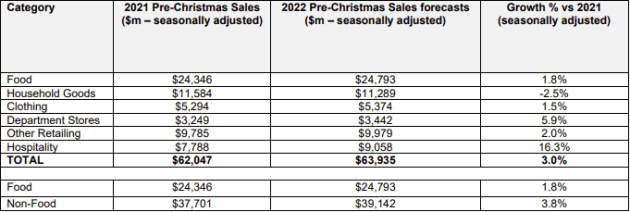Australians are forecast to spend $63.9 billion in pre-Christmas sales, up 3% on last year.
This is according to research from the Australian Retailers Association (ARA), Roy Morgan and Salesforce.
Across the states and territories, South Australia is set to record the biggest growth in sales on last year (up 6.6%), followed by the Northern Territory (up 6.5%).
Consumers in NSW are forecast to spend nearly $20 billion in the pre-Christmas sales (up 3.1% on 2021), with Victorians to fork out $16.5 billion (up 0.8%) and Queenslanders $13.3 billion (up 4.6%).
Department stores are set to experience the second largest year-on-year growth, following hospitality.
According to Salesforce’s Holiday Insights Hub, which tracks holiday shopping and commerce trends from November-December, inflationary pressures and climbing interest rates will “kick-start” holiday shopping earlier in Australia and New Zealand, with 33% of holiday sales forecast to occur in the first three weeks of November – before Cyber Week begins.
Salesforce also forecasts that 84% of sales will take place prior to the week of Christmas; 25% of all the sales during the holiday period will take place during Cyber Week; the average discount rate will be highest during Cyber Week, averaging 22% and; 70% of all traffic and 60% of all orders to occur on a mobile device during the holiday season.
ARA CEO Paul Zahra said the forecasts point to upbeat trading conditions in the run-up to Christmas.
“Christmas is the most critical time of year on the retail calendar and given the financial pressure households are under at the moment, we know that many businesses were feeling nervous about a potential downturn in spending over the festive period," Zahra said.
"However, the good news is that consumers are set to continue opening their wallets in the face of cost-of-living pressures."
Zahra said that retail sales are currently running at records levels, with forecasts showing sales will remain strong for the remainder of the year.
“There’s a delayed lag associated with rising interest rates and inflationary pressures, so there will inevitably be a softening of sales, but it appears that won’t occur until next year.
“While businesses are combating record levels of labour shortages and supply chain constraints, there’s still plenty to be optimistic about this Christmas.
"The Cyber Weekend sales are growing in popularity every year, and that’s set to provide retailers with good momentum for their festive trade."
Roy Morgan CEO Michele Levine furthered on this, saying the retail industry has proved resilient in 2022 despite the pressures. Particularly the pressure around rising interest rates, which Levine said is the fastest rate since 1994.
“Retail sales have been exceptionally strong during the last few months as consumers continue to benefit from the high level of savings built up during the pandemic," Levine said. "From extensive Government stimulus programs and the lowest level of unemployment in 50 years, allowing consumers to continue spending despite the financial pressures of inflation and higher interest rates."
And according to Jo Gaines, Salesforce Area VP retail and consumer goods, these forecasts show that Christmas will come early for retailers.
“We know retailers are feeling the squeeze," Gaines said. "To keep costs under control and boost sales, retailers need to look beyond tailoring communications to their customers and find ways to automate processes, remove friction and make it easier for consumers to purchase from them.
The cost of living factor
According to the National Retail Association, Australian consumers are cutting back on luxury goods and services as they switch to cheaper brands and seek bargains in a bid to navigate rising inflation
However, the NRA does echo the former sentiment on a “bumper” pre-Christmas sales season. In its own research prepared in conjunction with the Retail Doctor Group (RDG), it’s noted that almost half of shoppers are feeling confident, with onein five planning to outspend on last year.
The NRA and RDG’s Consumer Sentiment Report also found that 71% of consumers had changed their spending behaviour due to rising costs, and that purchasing decisions during the upcoming sales events would be driven largely by the discounts and offers available.
Boxing Day remains the most anticipated day in the retail calendar, but Black Friday and Cyber Monday pre-Christmas sales continue to grow in popularity.
NRA interim CEO Lindsay Carroll said the data showed Australian consumers were prepared to cut back on their day-to-day spending in order to splurge on special events such as Christmas.
“This follows trends we have seen in previous years, when interest rates and costs were rising,” Carroll said.
“People still want to feel special and have those great experiences. But rather than having regular dining experiences or spending that little extra on more expensive groceries or goods, they look for sales and special offers and they save their splurges for special occasions.”
The report also found that Australians still prefer shopping in-store for Christmas gifts, although on-line sales continue to grow in popularity, and that free delivery is a key factor in influencing online purchasing.
Carroll continued, saying the data showed retailers needed to be right at the top of their game in terms of price competitiveness, customer service and ease of shopping.
“What this means for retailers is that there are still customers out there willing to spend money on the festive season, but more than ever they are looking for bargains, for great shopping experiences and for smooth transactions.
“The challenge for business owners and their staff is greater than ever to have the right products, the best service and sharp pricing.
“Those who get these factors right can look forward to a very happy Christmas season.”



